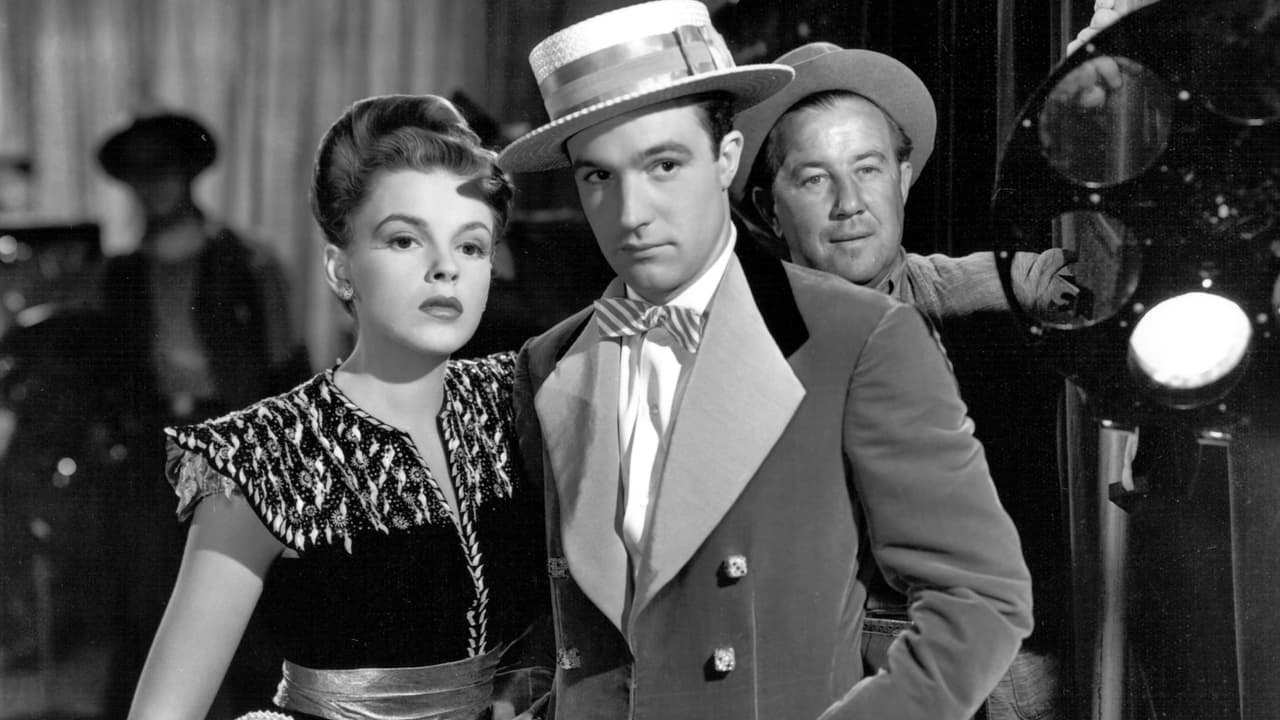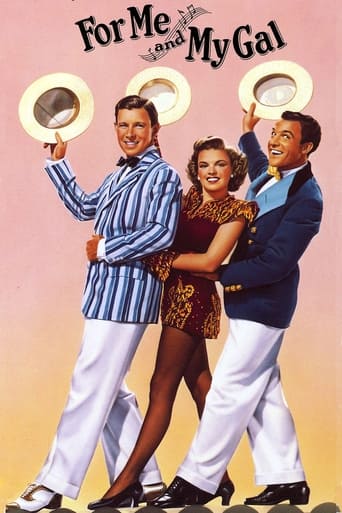

Gripping story with well-crafted characters
... View MoreIt really made me laugh, but for some moments I was tearing up because I could relate so much.
... View MoreThe thing I enjoyed most about the film is the fact that it doesn't shy away from being a super-sized-cliche;
... View MoreThis is a coming of age storyline that you've seen in one form or another for decades. It takes a truly unique voice to make yet another one worth watching.
... View MoreFor Me and My Gal is a rather odd bird. Set during World War I, The film begins by positioning itself as a tribute to the days of vaudeville, with sweet singer Judy Garland meeting obnoxious dancer Gene Kelly on tour. The two predictably team up after doing an impromptu version of For Me and My Gal that is the best thing in the movie.Then the movie wanders into soap opera before pulling the various war- themed threads together into a typical WWII rah-rah boost for contributing to the war effort.The story is a bit of a mess. I suspect the U.S. entry into WWII happened after the film was greenlighted and parts of it were grafted on as part of the war morale-boosting that was an inevitable part of most early 40s movies. There is a lack of cohesion, most notably with George Murphy's character, who feels like the vestigial tail of the original script. The movie also feels a little self-serving in its emphasis on the importance of entertainment for the troops. I feel this movie would have been done better if it's story had been allowed to play out without worries about patriotic fervor.Kelly is likable in his film debut, but his character is unsympathetic, and apparently the studio had to do a lot of reshooting before audiences could leave the theater not hating him. Garland is charming as she leaves her juvenile roles behind, although I can never be totally happy with any Garland movie that doesn't include at least one ballad. They have good chemistry, but it is better featured in The Pirate, which they made later on.The reason to watch a movie like this is for the musical numbers, but while these are good, there isn't much that is memorable (surprisingly director Busby Berkeley didn't do any of his trademark synchronized- chorus-girl numbers). There are also big chunks of the movie where the musical numbers disappear in favor of the story, which just highlights its weaknesses.Overall this isn't a horrible movie, but it's not one I'd particularly recommend.
... View MoreWith only three film appearances together, Gene Kelly and Judy Garland became a team with enough dynamite to blow memories of Judy and Mickey out of the barn. Fresh from Broadway, Gene never looked back as he took Hollywood by storm, and within a few years, was rivaling another dancer named Astaire who came back from a brief retirement to give Mr. Kelly, if I may, a run for his money. Here, Gene and Judy get a war story, timely for the time, even if the war they were fighting was the first World War, not the then current second one. They are members of separate vaudeville acts who come together as one, he replacing her old partner George Murphy (not a bad hoofer himself), and as fast as you can scramble to find a big yellow tulip, they are in love. But when their chance to hit the big time through the Palace in New York comes along, Gene is drafted, and his old selfish nature erupts which makes him not only unpatriotic but his own worst enemy.Like "This is the Army!", this takes the audience out to view the entertainers on the front, sometimes in dangerous areas of combat, and after realizing the mistake he made, Kelly is desperate not only to fight but to make his girl proud and win her back. But will he find her on the French trenches? Can Judy belt? Can Gene tap? Will Leo roar? Along the way, there's Judy and Gene "Ballin' the Jack", turnin' out the title song and briefly singing the rousing "When You Wore a Tulip" which had a hit recording where the two addressed each other by their real names. "I wore a big red rose!", to which Judy replies "A big fat rose", a memorable duet truncated for the movie much to this Judy fan's disappointment. Judy also gives a fantastic rendition of "After You've Gone", one of the best torch numbers of her career, showing all the emotion she would later empower with "A Star is Born". Gene's selfish character may have made certain audience members "boo" during the war, and it does seem as if he'll never turn over a new leaf or wake up and smell the chock full o' nuts. But MGM had "patriotism" on its mind in 1942, and there is no way it could let a leading man (especially a new one they intended to make a big star) remain "yeller". That old task masker Busby Berkley is once again at the helm of a Judy picture, and if he was taxing her as dramatized in her many biographies, it never shows. The chemistry between Judy and Gene is top dog and any indication of her teenage "Nobody's Baby" glamourless girl is totally gone. She's a star all the way from here, and Gene would rejoin her for two more musical ventures of varying themes where the memory of their first venture proved to be much more than a fluke.
... View MoreJudy Garland was just twenty years old when this movie was shot. Just twenty. I enjoyed it immensely because I feel that she was the greatest performer in the history of American show business.Sure, there have been great singers. Yes there have been great dancers and yes there have been great actors but no one besides Judy had all three talents so tightly rolled up into one. I found the storyline quite interesting even though Gene Kelly was the heel of heels but when you see and hear him and Judy in duets...man...that's what makes the world go 'round. How odd. Here we have a picture shot in 1942, 70 years ago and it's better than anything on the screen today. No, it's not a masterpiece but rather terrific wholesome family enjoyment and I highly recommend it to anyone who's disgusted with the stuff now being shown. It's simply top flight entertainment. Incidentally, the musical selections in this film are REAL MUSIC instead of the rock schlock now being heard. I borrowed a bit from Wikipedia to give you the details of that film's songs. * "Oh, You Beautiful Doll", music by Nat D. Ayer, lyrics by A. Seymour Brown, additional lyrics by Roger Edens performed by George Murphy, Judy Garland and others.* "For Me and My Gal", music and lyrics by George W. Meyer, Edgar Leslie and E. Ray Goetz, performed by Gene Kelly and Judy Garland* "When You Wore a Tulip and I Wore a Big Red Rose", music by Percy Wenrich, lyrics by Jack Mahoney, performed by Kelly and Garland* "After You've Gone", music by Turner Layton, lyrics by Henry Creamer, sung by Judy Garland.* "Ballin' the Jack", music by Chris Smith, lyrics by Jim Burris, sung and danced by Kelly and Garland.* The film also contains portions of a number of songs popular during World War I, including "By the Beautiful Sea", "There's a Long, Long Trail", "How Ya Gonna Keep 'Em Down on the Farm (After They've Seen Paree)", "Where Do We Go from Here, Boys", "It's a Long Way to Tipperary", "Goodbye Broadway, Hello France", "(There are) Smiles (That Make Us Happy)", "Oh Frenchy", "When Johnny Comes Marching Home Again" and "Pack Up Your Troubles in Your Old Kit-Bag, and Smile, Smile, Smile".* Two additional songs were intended to be included: "Spell of the Waltz", which was to be performed by Marta Eggerth and a male chorus and "Three Cheers for the Yanks", written by Ralph Blane and Hugh Martin. THAT'S CLASS, people. REAL HONEST-TO-GOODNESS CLASS.
... View MoreHow both stars must have rolled their eyes when they read this screenplay. The volume of clichés is atrocious: The oversentimental celebration of vaudeville; the romantic triangle; the heel gaining a conscience; the splitting-up-the-act intrigue; the brother and his fate; lines like "you'll never be ready for the big time, because you're small-time in your heart" (Judy nevertheless makes it work). Yet it's a pleasure to view, because Judy and Gene really bring out something special in each other. They did again in "Summer Stock"; in "The Pirate," to my eyes, not so much. She has a gravity and sincerity that balance his self-adoration and schtick, and he was always more persuasive playing a guy of questionable moral values than a mensch. You have to put up with George Murphy at his dullest and Ben Blue at his unfunniest, and Marta Eggerth, as accomplished as she is, appears to be in the wrong movie--she should be doing a Joe Pasternak operetta, not an Arthur Freed extravaganza. But when the two leads sing or dance (she was, in the Forties, a better dancer than she was ever given credit for) or, surprisingly, act together, they're tremendously moving. At her best, which she wasn't always but is here, Judy was the best there was. My favorite moment: the ending of "After You've Gone." Rather than smothering her performance in applause and cutting to a shot of an appreciative audience, Berkeley just fades out. It's MGM's way of saying: Enjoy it, folks, this is as good as it gets.
... View More